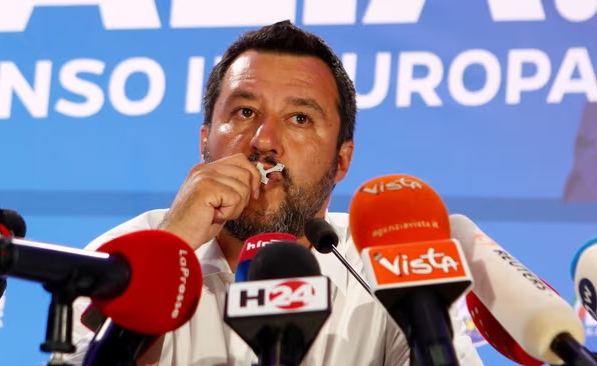European Parliament chief Roberta Metsola’s statement that a pro-EU coalition will be needed after the June 2024 elections has irritated Italy’s far-right leader Matteo Salvini, Euractiv reports.
Matteo Salvini accused her of trying to “cheat again” by partnering with left-wing parties against his desire for a “centre-right” coalition.
Salvini’s far-right League party is part of the Identity and Democracy group in the European Parliament (ID). Other far-right parties such as France’s Marine Le Pen, Germany’s AfD and Austria’s FPÖ are in the same group.
Far-right parties have been growing in popularity in Europe lately, but they will not be able to form a majority without partners from the right flank of the political spectrum. Salvini, who is also Deputy Prime Minister, wants the Italian model of governance to be applied at the EU level.
Italy’s coalition government is led by Prime Minister Giorgia Meloni’s party Fratelli d’Italia (European Conservatives and Reformists – ECR), Salvini’s League (ID) and the centre-right Forza Italia (European People’s Party). Despite his far-right anti-migrant and anti-European rhetoric and the fact that his party is officially linked to the far-right EU group, he insists on the term “centre-right” coalition in his public speeches. However, his EPP colleagues strongly deny such a partnership.
EPP President of the European Parliament Roberta Metsola arrived in Italy on Tuesday to attend a series of events in the south of the country. She was accompanied by Minister for European Affairs Raffaele Fitto (FDI/ECR) and is expected to meet Prime Minister Giorgia Meloni (Fratelli d’Italia/ECR). Metsola said:
“The European Parliament is a very pro-European institution. We have a majority with whom we work together, and when we go to the elections in June, we have to propose to the citizens a pro-European choice going forward for the next five years. I am optimistic.”
According to Salvini, Metsola’s words are an invitation to repeat the “treason” with the left, which he says led to the bloc’s current problems. He claimed:
“The League with its allies wants a different Europe: less taxes and obligations and more security, protection of borders, of the health of the work of European citizens. We think of a prosperous future based on work, security and freedom, led by the centre-right united also in Europe.”
A meeting of far-right parties organised by Matteo Salvini’s Lega (ID) party in Florence on Sunday sparked tensions within the Italian government that analysts in Rome say are likely to escalate ahead of the EU elections.
Following statements by Secretary and Foreign Minister Antonio Tajani, Forza Italia party members reiterate that an alliance with the ID in Brussels is impossible because of some parties such as Marine Le Pen’s Rassemblement Nationale or Germany’s AfD. Paolo Barelli, Forza Italia’s group leader in the Chamber, said:
“Forza Italia is an integral part of the European People’s Party: we are pro-European, and therefore, non-European parties cannot be in the majority with us.”
Talk of alliances after the EU elections puts Meloni in an uncomfortable position. Since she took over the Italian government, the conservative Meloni has toned down her anti-European rhetoric and moved closer to the centre. At the end of January, EU Council chief Charles Michel thanked her for showing “responsibility”.
However, earlier this week, her party member Nicola Procaccini, co-chair of the European Conservatives and Reformists (ECR) group, said that “it is possible to have a dialogue with Le Pen and Salvini, but not with the [German] AfD.” He noted:
“Alliances are made after elections, and majorities in Europe are variable. But the balance will shift to the right.”
The Greens, who are likely to make up the next pro-European majority in the EU House, have urged European powers to avoid the pitfalls of the far right in their public rhetoric. Co-president of the Greens Terry Reintke told Euractiv over the weekend:
“Democrats have to keep in mind if we run an election campaign trying to run after the narratives of the far-right […] we are always going to lose because also the centre-right groups, even if they are trying to mimic the far-right, at the end of the day, the people vote for the original.”
